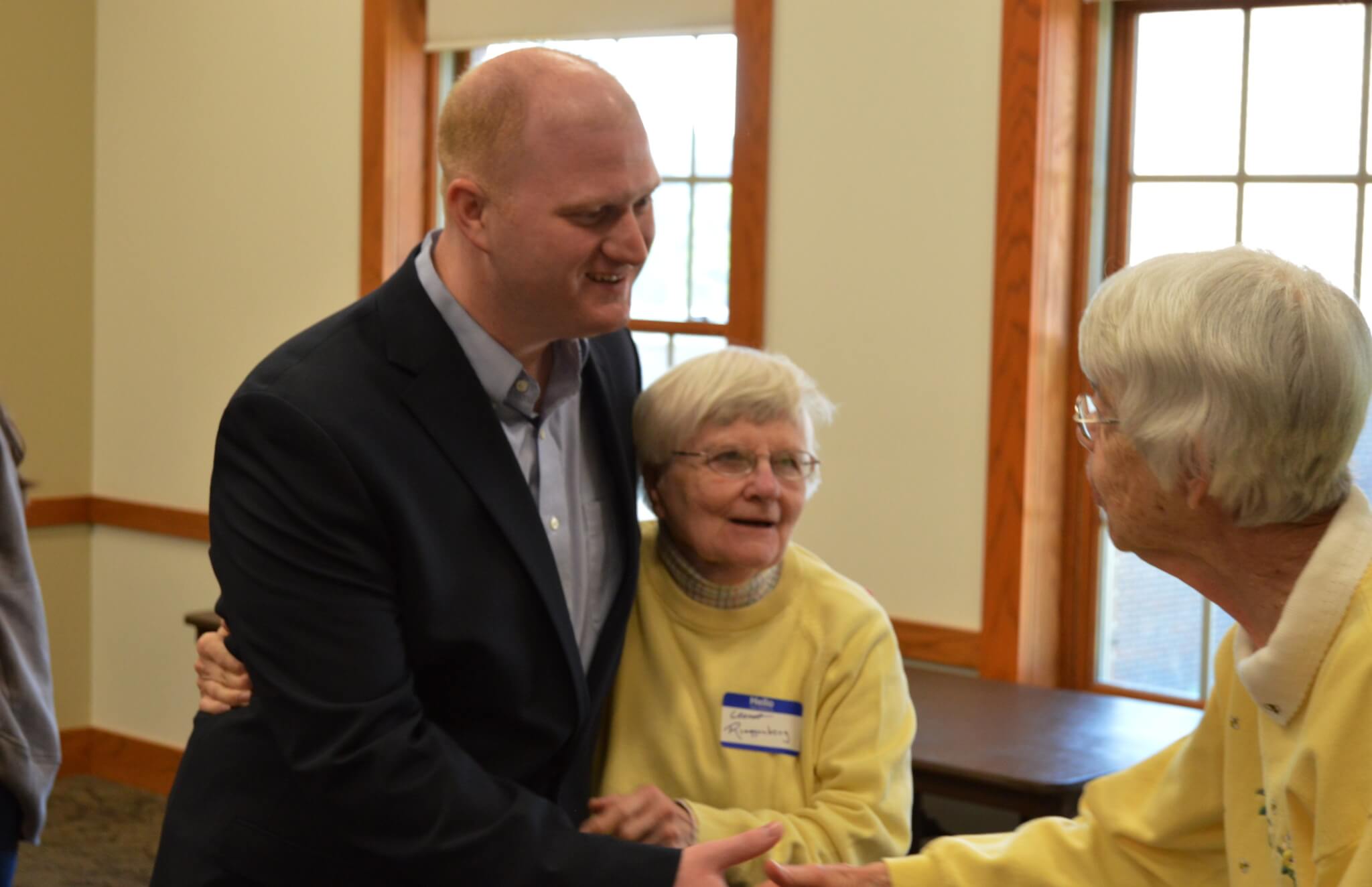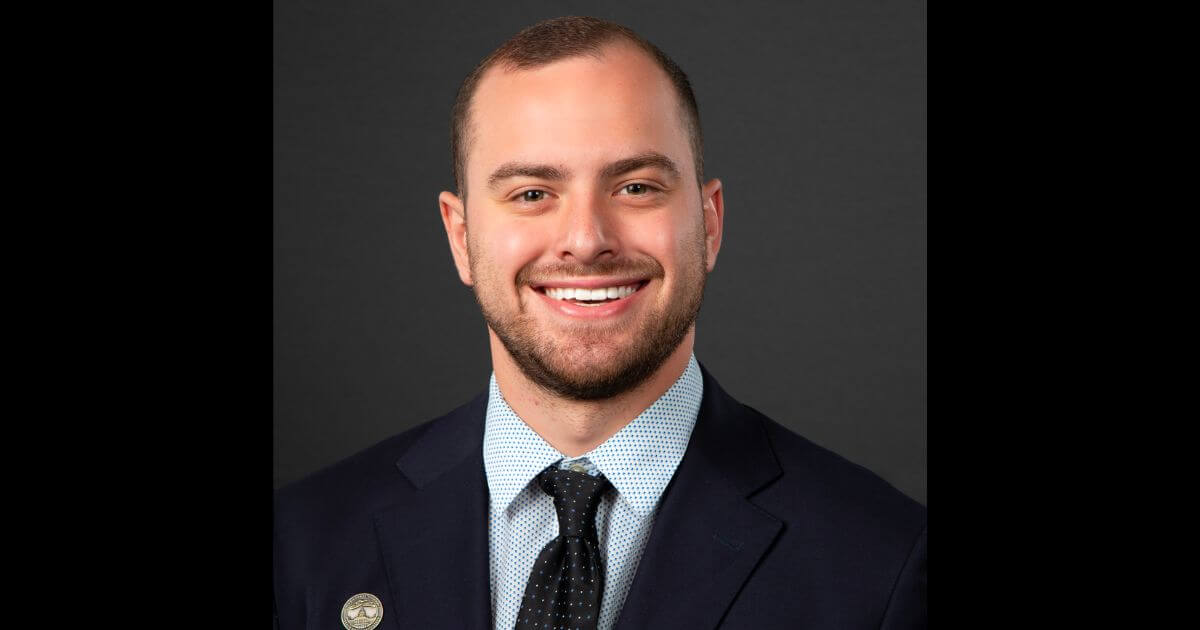
Jim Mowrer has heard this speech before.
Sitting at a table in Plymouth Church’s Waveland Hall two weeks ago, Mowrer listened as Mike Sherzan gave his pitch about his business background and issues he cared about. The speech Desmund Adams gave later hit on his usual key topics of building coalitions to win elections. And when Mowrer got up to address the 50 attendees at the early morning Women for a Concerned America organization, he slid easily into his own talking points.
“My entire career has been about service to Iowa and service to my country,” Mowrer says. “I grew up on a family farm here in central Iowa, but when I was seven years old my father was killed in a farming accident … The only thing that kept my family from falling so far down that we couldn’t get back up was the basic social safety net, in particular Social Security survivor benefits. That’s what formed my ideology and outlook from an early young age and, frankly, that’s why I’m a Democrat.”
He then ticks off his main biographical points – that he was part of the longest-serving active duty deployment during the Iraq War. He was Joe Biden’s veterans director. He helped pass the post-9/11 GI bill. He was appointed by President Obama to work in the Pentagon. He helped cut billions of dollars in government waste. And his motivation to improve health care is driven by his son who has an incurable neurodegenerative disease.
It’s a good pitch and makes for a good candidacy. And it’s one he’s told over, and over, and over again.

The three candidates await to turn to talk at Plymouth
The three Democrats vying for the nomination are quite familiar with each other at this point. Mowrer estimates they’ve presented together at over 30 debates, forums and community events during their campaigns. Those constant performances, however, will make an impact on who emerges victorious on Tuesday, and Democrats in the 3rd District have had plenty of opportunities to compare the three candidates to each other.
At this event after each are done speaking, they’re called back up to the front of the room for a Q&A. This is typically where Mowrer can stand out. Although only 30-years-old, Mowrer already has a wealth of in-depth policy knowledge from his time working in government.
He also likes to show off a sharp approach on politics too. When asked by an attendee how they’re going to contrast themselves with David Young, both Sherzan and Adams explain they’ve been solely focused on the primary election. Mowrer has a different answer.

Mowrer pitches his campaign
“David Young, as an incumbent, is very much undefined,” Mowrer explains. “In 2014 he got a pass from everybody … The challenge that we have in 2016 is to talk about his record. To talk about from Day 1 that he has voted consistently with the Tea Party. Voting seven times to repeal the affordable care Act. Six times to defund Planned Parenthood. Twice against the Equal Pay Act. He’s voted to privatize Medicare. He’s voted to cut Pell Grants for college students. He voted against the Export-Import bank … The party of Donald Trump, the party of the Tea Party, that is David Young’s party. That’s how we define him.”
Afterward Mowrer works the tables, chatting with the women over cups of coffee. Many exclaim how they like all three and that it’s a difficult decision.
“You been seeing me on TV?” he asks one of the women who recognizes him. “Yeah, the part you don’t see is them putting makeup on me.”
The next visit in the morning is with a uniformly supportive crowd. Mowrer and his campaign manager, Andrew Mulvey, head over to the Building Trades meeting, where representatives of many unions like the cement masons, pipefitters and bricklayers come together.
“Do you want to speak about volunteering?” Mowrer asks Mulvey if he wants to pitch the group.
“No, you’re the face of this campaign,” Mulvey insists.
“The beautiful, beautiful face,” Mowrer responds sarcastically.
The building trade unions they arrive to meet with have already endorsed Mowrer, who has racked up a number of labor union backings in this campaign.
“Any big issues? Plenty of work still?” Mowrer asks a bricklayer member as he sits down next to him.
“Plenty of work, lots of competition,” he responds.
“What kind of competition?”
“Non-union, we get a lot of contractors out there, a lot of people who stretch the law basically. Nobody really does anything about it. We can take check stubs, the whole nine yards, nothing.”
“It’s a huge problem – driving down wages, getting less quality too,” another labor member chimes in, and brings up the problems with a low minimum wage.
“If there’s anything I can do at the federal level, I’ll be happy to do it,” Mowrer tells them. “We’ve got too many anti-labor members … When you’re working 40 hours a week, especially when you’re skilled and you can’t get by, that’s ridiculous.”
Another person hands Mowrer a flier about a labor luncheon going on the next day.
“All I heard is free luncheon,” Mowrer says, and adds it to their schedule.
Once everyone is there, Earl Agan, the president of the Central Iowa Building Trades organization, introduces Mowrer. He keeps his remarks brief, under three minutes.

Mowrer speaks to union members
“Everybody’s been seeing Andy on TV, couldn’t do it without him,” Mowrer says, pointing to a man who’s been in their ads, as the union members chuckle. “Obviously, we’re 100% focused on beating David Young in November, but we obviously don’t want to overlook or take for granted the primary we have on June 7. So I ask for all of your help and support – I stand with you on all of your issues.”
The Laborers have already done some door-knocking for their endorsed candidate, and Mowrer encourages the rest to bring their members to the polls.
On their walk out, though, Mulvey reminds the candidate of a line he forgot in his pitch.
“I’m glad you always know what I missed,” Mowrer jokes with this campaign manager.
“It’s never a 100% right answer, it’s a 90% right answer,” Mulvey says.
“Hey, someone’s gotta tell you,” Mowrer notes, shrugging his shoulders.
Mowrer and Mulvey head back to their cramped campaign headquarters in an office building across from Merle Hay mall (they’ve since expanded). Field staff and volunteers are making phone calls in the front of the office to seniors, as well as sending out absentee ballot requests in the mail. Two offices connect to the main room – the larger one houses his three finance staffers; the smaller is where Mowrer does his phone calling.
And that’s where the real work of the day begins.

Campaign workers send out absentee requests at Mowrer HQ
For all the Democrats running for office decrying the importance of money in politics and vowing to pass campaign finance laws, the simple fact of the matter is that these campaigns cost money. A lot of money.
While his opponent Sherzan has personally loaned around $640,000 to his own campaign, Mowrer has raised $750,000 for his largely through the phones – the vast majority of it has come from individual donors. In 2014, Mowrer raised over $2 million in his race against Steve King, though he ended up losing 62% to 38% in the Republican wave year.
A lot of those donors, however, are still with him. So Mowrer locks himself in a small room with a finance staffer who hands him call sheets and Mowrer begins the calls. He dials two phones at a time – waiting 15 seconds for one to ring before starting the other – to maximize the effort. And one by one, slowly but surely, he gets more pledges and donations to build the campaign and communicate their message. It’s a task that few candidates like to do, but it’s necessary – and it’s one that Mowrer excels at.

Mowrer and his fellow 3rd District candidates
He thinks that base of support and experience from his first run will end with a better outcome in this campaign.
“It’s a completely different environment between a midterm and presidential year,” Mowrer says during an interview, adding that the caucus really excited people. “Obviously you always learn from your first experience. When Senator Harkin was calling me and encouraging me to run, he told me he didn’t win his first race either, and the second time around is a great opportunity, you’re so much stronger … We’ve got a great grassroots donor network, over 4,000 individual donors, these are people who’ve been with me.”
He gets a short break around lunchtime, heading out to the main room to microwave a sad-looking frozen dinner. Mowrer and Mulvey sit back down in the call room to listen in to a briefing call from Truman National Security Project. It’s an organization that holds calls with Democratic candidates to make sure they’re well-informed on the type of issues that Republicans often hit them on.
Today’s topic is the Zika virus. Mowrer notes he’s very concerned that it could become a big campaign issue in the summer.
“This is a much bigger threat than Ebola ever was, and we all saw how Republicans blew that up as a political issue,” Mowrer says, adding how ridiculous it is that David Young’s Congress hasn’t passed funding to combat it. “I talk about this on the trail.”

Mowrer and Mulvey in the call room
The call runs for about a half hour and is rather informative, detailing how the Zika virus works, government measures that could be done, and methods to stop the spread of mosquitos, including nets, bats and spiders.
“Do you think we should come out as pro-spider?” Mulvey asks his candidate.
“I don’t know, Spiderman is pretty popular these days,” he responds, but he’s leaning toward bats.
Jokes with his staff aside, developing these messaging ideas are a central focus of Mowrer’s. He feels the lack of effective ones in 2014 doomed the party then. So he’s looking for unique issues like this to pressure Young on.
“Democrats I don’t think had a singular message that we were putting forward to the country of what our agenda was,” Mowrer explains. “When you have that kind of chaos where every campaign isn’t focused on Democrats winning, they’re only focused on their race, and only focused on limiting the damage, not being out there touting progressive values, then we all lose. There was anticipation, I think, of loss in the midterms … I think we have to be on the offensive.”
Following the call Mulvey presents several mail piece proofs for Mowrer to review, and they go over their packed schedule. After a few more hours of donor calls, Mowrer gets ready for his television interview that afternoon with Dave Price on WHO-TV. They swing by Mowrer’s house to change into a suit, and Mowrer gets a few moments with his wife, son Jack, and family pets.
On the drive to the studio, Mowrer gets ready for the bright lights.
“The thing they don’t tell you about running for Congress is that you have to apply your own makeup before going on TV,” he says while doing so. “The problem is I’m too shiny.”
Mowrer and Price shake hands in the lobby before heading in. Each person who appears on Price’s The Insiders signs a board. The 2016 one includes Steve King on it, but Mowrer demurs from a suggestion to put his signature next to King’s.

Mowrer with Dave Price at WHO
They sit down at Price’s interview table and start recording, Price going through his questions with Mowrer, hitting on many of the subjects you would expect in a profile piece. The piece goes well, with Mowrer getting several chances to highlight his military experience.
“I can tell you’ve been through this before,” Price comments during one of their commercial breaks.
While that military background comes up often in Mowrer’s appearances at events and in interviews, it also drives his thinking in how he handles this campaign.
“We’re in the fight,” Mowrer reflects in an interview on the way back to the office, saying that the 3rd District is ground zero for Democrats for many key races. “In the military, that’s the term they use, ‘in the fight.’ And usually, you’re jealous if somebody else is in the fight, and you’re not. And I’m glad to be in the fight … All of these races are interlocking fields of fire, they all compliment one another. That’s why I’m excited, because we have a strength of ticket in this cycle … I think the Republicans are going to be on defensive and in retreat.”
For a candidate who’s run his campaign with a certain military-like efficiency, working on all the important mechanics that make a successful run hum, the work may last long hours, but it has a clear focus.
That’s what Mowrer heads back to after the Price interview, walking back into a busy campaign office to make more donor calls, oversee more volunteers talking to voters and turning out the early vote. In a few days’ time they’ll know if their mission is a success.
Read the rest of our A Day On The Trail Series of the major June 7 primary candidates:
Rob Hogg
Patty Judge
Pat Murphy
Monica Vernon
Desmund Adams
Jim Mowrer
Mike Sherzan
by Pat Rynard
Posted 6/3/16

Lanon Baccam wins 3rd District Dem primary, will face Zach Nunn
Baccam defeats Melissa Vine to challenge Republican incumbent Lanon Baccam defeated Melissa Vine in Tuesday’s Democratic primary for Iowa’s 3rd...

Hardin County man running for office as Trump-loving Democrat to local party’s dismay
Brad Rewoldt, who recently changed his party affiliation from Republican, says his support of Trump will probably 'piss off' Democrats There is a...

Scheetz: Tax cuts for all Iowans, not just the wealthy
State Rep. Sami Scheetz says all Iowans should benefit from tax cuts via a sales tax reduction As a state representative, my job is to serve the...

Kalbach: What Iowa Republicans focused on during legislative session
Our state legislative session finished up towards the end of April, and I’m glad it’s over! From further de-funding and privatizing our public...

Advocates file suit to stop Iowa’s ‘unconstitutional’ immigration law
Immigration advocates filed a federal lawsuit Thursday to stop Iowa’s new immigration law—SF 2340—from taking effect arguing that the legislation...

Iowa Republicans make outlawing gay marriage key 2024 campaign priority
Iowa Republicans have made outlawing gay marriage a key goal in their 2024 party platform. During the Iowa GOP’s 2024 state convention on Saturday,...





